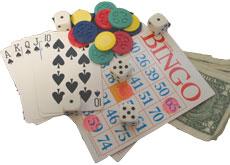Counselors to take closer look at students’ gambling problems

Counselors to take closer look at students’ gambling problems
Recent statewide surveys confirm gambling percentages are increasing among Missouri college students.
During the last week of April in Billingsly Student Center, the counselors from Student Support Center will be handing out information on the dangers gambling.
“We want to make those resources available and let the students know that there is help available,” said Faustina Abrahams, Student Support Center counselor.
The American Psychological Association classifies compulsive gambling as a mental health disorder due to the impulse control to gamble. Impulsive and addicted gamblers have a lower levels of a brain chemical called norepinephrine, which is believed to be part any addiction problem.
Three phases of gambling addiction are winning, losing and desperation. In the winning phase, the gambler experiences a big win, or series of wins, and leaves them with a feeling they cannot lose. The losing phase includes borrowing money to chase debts. The final phase is desperation, when remorse sets in. Blaming others and becoming withdrawn from family and friends are classic symptoms of
addiction.
“All I did was watch ESPN and read scouting
reports on my free time,” said Darrell Sour, sophomore marketing and management major.
“I pulled in more money than at my part-time job.”
Sports wagering continues to be a growing problem on college campuses in the United States and Canada. More adolescents report that the primary reasons for gambling are for excitement and enjoyment, and not for money.
“After
awhile you start to
realize that you’re taking money from people who have real jobs that don’t allow them to watch sports all day,” Sour said. “If you win, it means you’re willing to take advantage of someone’s ignorance in regards to the sport,” he said.
Action gamblers are addicted to the thrill of the risk taking. Adrenaline drives the gambler for winning against other gamblers. Escape gambling is used for people to forget about life’s daily problems.
Abrahams said pathological gamblers become so involved in gambling they sometimes commit illegal crimes to pay their gambling debts. Teens are three times more likely to become pathological gamblers than adults are.
Not only do the gamblers have to fight the addiction but the family members do, too. This takes a toll on the family emotionally and financially.
Sours said he could not take advantage of people any longer.
“It really put me at odds with my own ethical standards,” he said.
For help with gambling problems, persons may call 1-888-betsoff.
Your donation will support the student journalists of Missouri Southern State University. Your contribution will allow us to purchase equipment and cover our annual website hosting costs.















